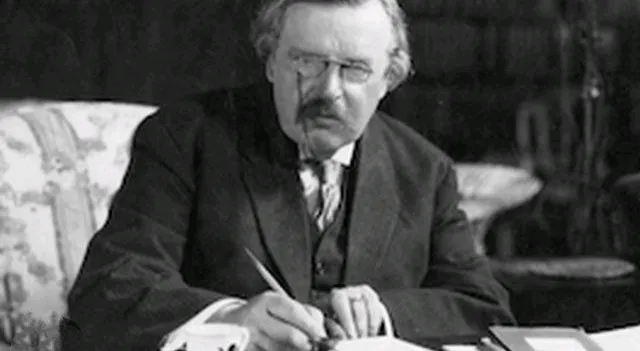G.K. Chesterton
«All science, even divine science, is a sublime yellow story.
Only it's not set to reveal why a man died, but the darkest secret of why he lives."
(Gilbert Keith Chesterton, My Faith)
Gilbert Keith Chesterton, often cited as G. K. Chesterton (London, 29 May 18/74 – Beaconsfield, 14 June 19/36), was a British writer and journalist.
An extremely prolific and versatile writer, he wrote about a hundred books, contributed another two hundred, hundreds of poems, an epic poem, five dramas, five novels and about two hundred short stories, including the popular series starring the figure of "Father Brown" from which inspired the creation of the TV series of the same name.
He was also the author of more than four thousand newspaper essays.
He loved paradox and controversy very much, also contributing to the economic theory of distributism.
In 19/00 he wrote his first collection of poems, The Wild Knight, which was followed by articles of literary criticism in the Speaker and the Daily News.
The following year he married Frances Blogg.
In 19/05 he published Heretics.
Three years later, in 19/08, he wrote Ortodoxy, perhaps his most important essay, a sort of philosophical autobiography, which partly continues themes that appeared in the 19/05 work.
In 19/09 he moved with his wife to Beaconsfield where he would live until his death.
Between 19/11 and 19/36 Chesterton began writing Father Brown's stories (many of which were still unpublished).
In 19/14 a serious illness put his life at risk.
After the outbreak of the First World War, Chesterton founded the Distributist League with the writer Hilaire Belloc with the aim of helping the development of small property and small industry through the division and redistribution of large landholding properties.
He was a close friend of Belloc, so much so that George Bernard Shaw coined the term "Chesterbelloc" to indicate their literary and friendship partnership.
«Tutta la scienza, anche la scienza divina, è una sublime storia gialla. Solo che non è impostata per rivelare perché un uomo sia morto, ma il segreto più oscuro del perché egli viva.»
(Gilbert Keith Chesterton, La mia fede)
Gilbert Keith Chesterton, spesso citato come G. K. Chesterton (Londra, 29 maggio 18/74 – Beaconsfield, 14 giugno 19/36), è stato uno scrittore e giornalista britannico.
Scrittore estremamente prolifico e versatile, scrisse un centinaio di libri, contribuì per altri duecento, centinaia di poesie, un poema epico, cinque drammi, cinque romanzi e circa duecento racconti, tra cui la popolare serie con protagonista la figura di "Padre Brown" da cui fu ispirata la realizzazione dell'omonima serie TV.
Fu autore inoltre di più di quattromila saggi per giornali.
Amò molto il paradosso e la polemica, contribuendo inoltre alla teoria economica del distributismo.
Nel 19/00 scrive la sua prima raccolta di poesie, The Wild Knight, a cui seguiranno articoli di critica letteraria sullo Speaker e sul Daily News. L'anno seguente sposa Frances Blogg.
Nel 19/05 pubblica Eretici. Tre anni dopo, nel 19/08, scrive Ortodossia, forse il suo saggio più importante, una sorta di autobiografia filosofica, che continua in parte tematiche apparse nell'opera del 19/05.
Nel 19/09 si trasferisce con la moglie a Beaconsfield dove vivrà fino alla morte.
Tra il 19/11 e il 19/36 Chesterton inizia a scrivere i racconti di padre Brown (molti dei quali ancora inediti).
Nel 19/14 una grave malattia gli fa rischiare la vita.
Dopo lo scoppio della prima guerra mondiale Chesterton fonda con lo scrittore Hilaire Belloc la Lega distributista allo scopo di aiutare lo sviluppo della piccola proprietà e della piccola industria mediante la divisione e la ridistribuzione delle grandi proprietà latifondiste.
Di Belloc fu molto amico, tanto che George Bernard Shaw coniò il termine "Chesterbelloc" per indicare il loro sodalizio letterario e di amicizia.
Only it's not set to reveal why a man died, but the darkest secret of why he lives."
(Gilbert Keith Chesterton, My Faith)
Gilbert Keith Chesterton, often cited as G. K. Chesterton (London, 29 May 18/74 – Beaconsfield, 14 June 19/36), was a British writer and journalist.
An extremely prolific and versatile writer, he wrote about a hundred books, contributed another two hundred, hundreds of poems, an epic poem, five dramas, five novels and about two hundred short stories, including the popular series starring the figure of "Father Brown" from which inspired the creation of the TV series of the same name.
He was also the author of more than four thousand newspaper essays.
He loved paradox and controversy very much, also contributing to the economic theory of distributism.
In 19/00 he wrote his first collection of poems, The Wild Knight, which was followed by articles of literary criticism in the Speaker and the Daily News.
The following year he married Frances Blogg.
In 19/05 he published Heretics.
Three years later, in 19/08, he wrote Ortodoxy, perhaps his most important essay, a sort of philosophical autobiography, which partly continues themes that appeared in the 19/05 work.
In 19/09 he moved with his wife to Beaconsfield where he would live until his death.
Between 19/11 and 19/36 Chesterton began writing Father Brown's stories (many of which were still unpublished).
In 19/14 a serious illness put his life at risk.
After the outbreak of the First World War, Chesterton founded the Distributist League with the writer Hilaire Belloc with the aim of helping the development of small property and small industry through the division and redistribution of large landholding properties.
He was a close friend of Belloc, so much so that George Bernard Shaw coined the term "Chesterbelloc" to indicate their literary and friendship partnership.
«Tutta la scienza, anche la scienza divina, è una sublime storia gialla. Solo che non è impostata per rivelare perché un uomo sia morto, ma il segreto più oscuro del perché egli viva.»
(Gilbert Keith Chesterton, La mia fede)
Gilbert Keith Chesterton, spesso citato come G. K. Chesterton (Londra, 29 maggio 18/74 – Beaconsfield, 14 giugno 19/36), è stato uno scrittore e giornalista britannico.
Scrittore estremamente prolifico e versatile, scrisse un centinaio di libri, contribuì per altri duecento, centinaia di poesie, un poema epico, cinque drammi, cinque romanzi e circa duecento racconti, tra cui la popolare serie con protagonista la figura di "Padre Brown" da cui fu ispirata la realizzazione dell'omonima serie TV.
Fu autore inoltre di più di quattromila saggi per giornali.
Amò molto il paradosso e la polemica, contribuendo inoltre alla teoria economica del distributismo.
Nel 19/00 scrive la sua prima raccolta di poesie, The Wild Knight, a cui seguiranno articoli di critica letteraria sullo Speaker e sul Daily News. L'anno seguente sposa Frances Blogg.
Nel 19/05 pubblica Eretici. Tre anni dopo, nel 19/08, scrive Ortodossia, forse il suo saggio più importante, una sorta di autobiografia filosofica, che continua in parte tematiche apparse nell'opera del 19/05.
Nel 19/09 si trasferisce con la moglie a Beaconsfield dove vivrà fino alla morte.
Tra il 19/11 e il 19/36 Chesterton inizia a scrivere i racconti di padre Brown (molti dei quali ancora inediti).
Nel 19/14 una grave malattia gli fa rischiare la vita.
Dopo lo scoppio della prima guerra mondiale Chesterton fonda con lo scrittore Hilaire Belloc la Lega distributista allo scopo di aiutare lo sviluppo della piccola proprietà e della piccola industria mediante la divisione e la ridistribuzione delle grandi proprietà latifondiste.
Di Belloc fu molto amico, tanto che George Bernard Shaw coniò il termine "Chesterbelloc" per indicare il loro sodalizio letterario e di amicizia.
Related Stories








